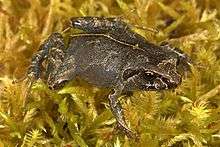Psychrophrynella
Psychrophrynella is a genus of frogs in the family Craugastoridae.[2] Alternatively, it has been placed in the family Strabomantidae.[3] The genus is distributed on the Andes of southern Peru and Bolivia.[2] One of the four species assessed by the International Union for Conservation of Nature (IUCN) is assessed as "Critically Endangered".[4]
| Psychrophrynella | |
|---|---|
 | |
| Psychrophrynella usurpator | |
| Scientific classification | |
| Kingdom: | Animalia |
| Phylum: | Chordata |
| Class: | Amphibia |
| Order: | Anura |
| Family: | Craugastoridae |
| Subfamily: | Holoadeninae |
| Genus: | Psychrophrynella Hedges, Duellman, and Heinicke, 2008[1] |
| Type species | |
| Phrynopus bagrecito Lynch, 1986 | |
| Diversity | |
| See text | |
The name Psychrophrynella is a contraction of the Greek psychros meaning cold and phrynos meaning toad, with the Greek diminutive suffix ella. It refers to their relatively cold habitats.[1]
Description
Psychrophrynella are small frogs measuring between 14 and 33 mm (0.55 and 1.30 in) snout–vent length. They are characterized by narrow head, absence of differentiated tympanic membrane (except in Psychrophrynella boettgeri) and, in most species, absence of tympanic annulus. Dorsum is smooth, granular, or shagreen. Venter is finely granular, granular, or coarsely granular (but smooth in Psychrophrynella pinguis).[1]
Species
The following species are recognised in the genus Psychrophrynella:[2][3]
- Psychrophrynella bagrecito (Lynch, 1986)
- Psychrophrynella chirihampatu Catenazzi and Ttito, 2016
- Psychrophrynella glauca Catenazzi and Ttito, 2018
- Psychrophrynella usurpator De la Riva, Chaparro, and Padial, 2008
References
- Hedges, S. B.; Duellman, W. E.; Heinicke, M. P (2008). "New World direct-developing frogs (Anura: Terrarana): Molecular phylogeny, classification, biogeography, and conservation" (PDF). Zootaxa. 1737: 1–182.
- Frost, Darrel R. (2017). "Psychrophrynella Hedges, Duellman, and Heinicke, 2008". Amphibian Species of the World: an Online Reference. Version 6.0. American Museum of Natural History. Retrieved 11 March 2017.
- "Strabomantidae". AmphibiaWeb: Information on amphibian biology and conservation. [web application]. Berkeley, California: AmphibiaWeb. 2017. Retrieved 11 March 2017.
- IUCN. "IUCN Red List of Threatened Species. Version 2016.3. <www.iucnredlist.org>". Retrieved 11 March 2017.